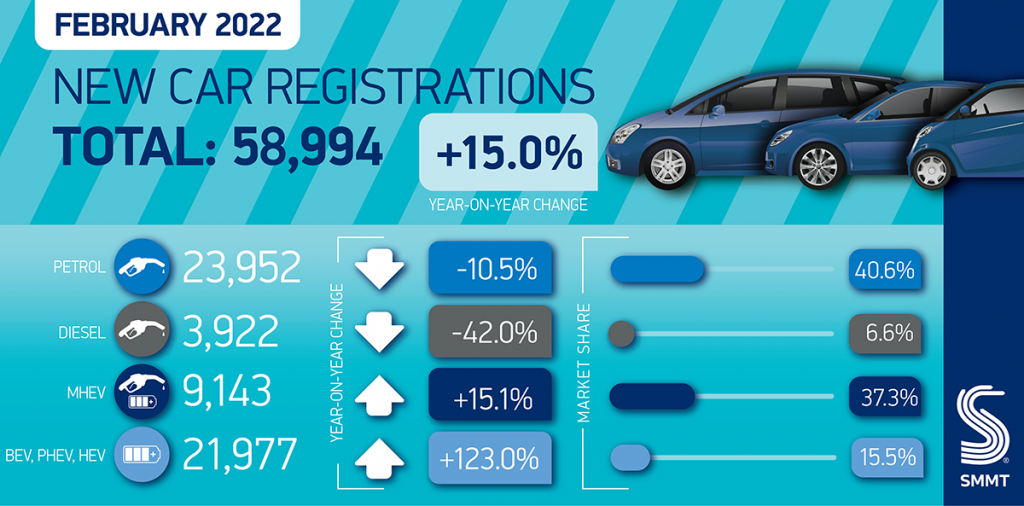Last updated on April 1st, 2022 at 06:31 am
Battery electric vehicles (BEVs) enjoyed another bumper month in February taking a 17.7% market share, according to the Society of Motor Manufacturers and Traders.
In total, 10,417 BEVs and 4,677 PHEVs (plug-in hybrids) were sold last month. This took the PHEV market share to 7.9% overall.
If we include the 6,883 HEVs (Hybrid Electric Vehicles) registered, then EVs made up more than a third of all new cars sold.
Out of the top 10 bestselling cars across all fuel types in February in the UK, the Tesla Model Y and Model 3 took fourth and fifth spots respectively.
The industry body said that these figures reflect the growing demand for EVs, considering February is typically the lowest volume month of the year. This is because “many buyers delay purchases until the ‘new plate’ month of March, and fluctuations in supply for some key models can have a more pronounced effect in terms of market share”.
But to secure the long-term delivery of net zero road transport requires an acceleration in public chargepoint provision, said the SMMT.
Right now, the number of charges being installed is not keeping at pace with the number of EVs joining UK roads.
And in April, the Electric Vehicle Homecharge Scheme (EVHS) is ending, which has provided homeowners with vital funding to install their own chargepoints.
Last month, WhichEV reported the SMMT’s seven-point plan to increase the number of on-street public chargers.
The SMMT is now calling for an extension to both the EVHS and its business counterpart, the Workplace Charging Scheme, beyond 2025 to ensure EV uptake remains on track to meet Government’s net zero deadlines.
It is also recommending that VAT on electricity used for public charging points be cut to match that for home use to ensure EV drivers are treated equally regardless of where they charge their vehicle.
That call for a reduction has been echoed within the EV industry. Ian Johnston, CEO of Osprey Charging, told media, “We support the idea of reducing the VAT rate for public charging from 20%, to match the home tariff VAT of 5% and we’re disappointed to not see this change take effect. At a time when energy prices are increasing, this saving could have made a big difference for EV drivers – particularly for those that don’t have driveways and so are heavily relying on the public network. If the government wants to encourage EV ownership for everyone, it needs to ensure it minimises inequalities in charging costs like this as much as possible.”
It was a better month for the market as a whole as well with new car registrations rising by 15% as 58,994 cars joined Britain’s roads. But despite this positive performance it is important to note that registrations are still down 25.9% on pre-pandemic levels as vehicle supply remains constrained by the ongoing chip shortage.
“Despite February’s traditional low registration numbers, consumers are switching to EVs in ever-increasing numbers,” said Mike Hawes, SMMT’s chief executive.
“More than ever, infrastructure investment needs to accelerate to match this growth. Government must use its upcoming Spring Statement to enable this transition, continuing support for home and workplace charging, boosting public chargepoint rollout to tackle charging anxiety and, given the massive increase in energy prices, reducing VAT on public charging points. This will energise both consumer and business confidence and accelerate our switch to zero emission mobility.”
